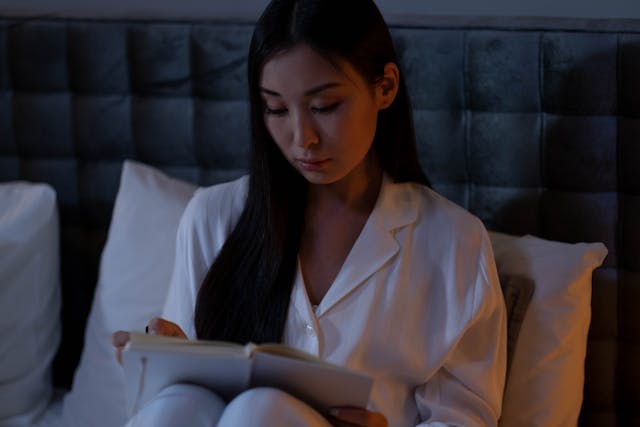With our increasingly busy lives and constant connectivity, a proper rest is often one of the first things we forfeit. Between busy schedules, screen time and stress from our endless to-do lists, getting enough rest feels like a luxury but good sleep is not a luxury – it’s a necessity. While pills may offer temporary respite, they often come with unwanted side effects. Here’s the good part, there are natural, healthy and effective ways to improve your sleep without relying on pills.
1. Create A Calming Bedtime Routine
Establish a calming pre-sleep routine to signal your brain that it’s time to unwind. This can include:
- A warm bath
- Light stretching or yoga
- Reading a book(not on a screen) or meditation
- Journaling
- Listening to calming music or nature sounds
Aim to start your routine at least 30 – 60 minutes before bedtime. During this time, avoid anything stimulating like scrolling through social media, checking emails or anything that would take you to your screen.
2. Optimize Your Sleep Environment
Your bedroom should be a safe place for sleep and a hideaway for quality rest. Here’s the plan:
- Keep it cool and cozy: The ideal temperature for sleep is between 600F to 650F (15.60C to 18.30C) a comfortable range that is not too cold or too hot which aligns with the natural decrease in body temperature before sleep.
- Block out light: Use blackout curtains or an eye mask preferably to eliminate disruptive light.
- Limit noise: Consider using a white noise machine or ear plugs to block out distracting sounds, if necessary or in a noisy area.
- Invest in comfort: A supportive mattress and soft, breathable bedding can make a big difference. In addition, your bedroom should be dedicated to sleep and intimacy alone. Avoid working, watching TV or eating in bed as these activities can play a huge role in confusing your brain’s association with sleep and proper rest.
3. Get Natural Sunlight During The Day
Exposure to natural sunlight in the morning for at least 15 – 30 minutes helps regulate the circadian rhythm (the body’s internal clock) which depends heavily on light exposure, which makes falling asleep at night easier. If sunlight isn’t available like during the winter, consider using a light therapy lamp in the early hours.
4. Cut Down On Caffeine And Alcohol Intake
Caffeine can linger in your system for up to 8 hours, so consuming coffee in the afternoon may disrupt your sleep. Avoid caffeine intake after 2-4 pm, consider taking herbal teas like chamomile or lemon balm instead.
Alcohol might help you fall asleep faster, but it affects your sleep cycle and reduces the quality of your rest.
5. Limit Screen Time Before Bed
Melatonin, the hormone that tells the body it’s time to sleep, is suppressed by the blue light emitted from gadgets like phones, laptops and tablets. Consider turning off screens at least 60 minutes before bed.
Additionally, activate a blue light filter or wear blue light – blocking glasses, if you must use a device.
6. Practice Relaxation Techniques
Anxiety and chronic stress are major sleep disruptors. An uncomplicated relaxation technique can help calm your mind and prepare your body for rest.
- Deep breathing exercises (like the 4 – 7 – 8 technique)
- Led meditation or mindfulness
- Visualization, such as imagining yourself in a peaceful setting.
Additionally, Apps like Calm, Headspace or Insight Timer offer assisted meditations precisely designed for better sleep.
7. Keep A Consistent Sleep Schedule
Stick to a sleep schedule. Going to bed and waking up at the same time every day – weekends included – helps in the regulation of your internal clock and improves the quality of sleep. Resist the urge to “get some extra sleep” or “ make up for lost sleep” especially during weekends as it can disrupt your regular sleep cycle.
Final Thoughts
You don’t have to rely on sleeping pills to get a good night’s rest. By making small, precise and consistent changes like establishing a bedtime routine, reducing screen time and optimizing your step environment, you can significantly improve your sleep quality.

